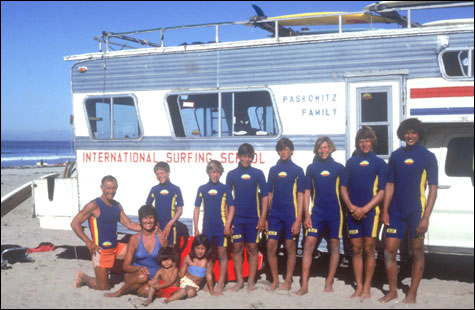
HOME + SCHOOL + THERAPY? The Paskowitzes' camper. |
| Directed by Doug Pray | written by Doug Pray | Consolidated Documentaries | 93 minutes at SPACE Gallery, 538 Congress St, Portland | 7:30 pm May 28 |
Doug Pray’s deceptively conventional documentary, Surfwise, is an open-minded look at familial, spiritual, and physical fundamentalism. With an increasingly unsettling lack of judgment, it considers the upbringing of the Paskowitzes, a family of wandering surfers — father, mother, eight sons, and a daughter — who forsook education and society in order to live in constant search of the best waves.We meet the head of the clan, Dorian “Doc” Paskowitz, at the age of 84. Doc is a marvel of unblinking devotion to a host of tenets: his Jewish faith (it’s claimed that he introduced surfing to Israel while on pilgrimage in the ’50s), “the culture of the wave,” peak physical fitness, and frequent sex. We first encounter him at length naked, praying and exercising, explaining the merits of his routine.
In pursuit of his extremist ideals, Doc escaped the material world in the late ’50s. He abandoned his medical practice (he graduated from Stanford) and took his wife off the grid, keeping her pregnant through the 1960s and some of the ’70s until they had a family of nine beautiful, healthy children, whom they drove from one surfing destination to another throughout their childhood.
Initially, the tale is hokey and sort of inspiring. Pray has a light and mechanical touch as a director. He labels family members and talking heads with a whoosh of graphics dotted with palm trees, like something you’d see on an MTV reality competition. Explanatory montages of old surf videos and family photos are accompanied by boring, inoffensive music, but Pray moves the story along quickly, and Doc’s spirit is unwavering and sometimes infectious.
The director’s mundane tactics take a fascinating turn when the dirty details of the Paskowitzes’ itinerant lifestyle pile up. The 11 of them lived out of a 24-foot camper, the children kept awake by the parents’ noisy sex (“Fucking, to me,” Doc says,” is the word of God”). The kids kept a strict diet (no fat, no sugar, no flour), were forced to work through serious injuries, competed against each other for awards and dad's goodwill, and were denied formative experiences (school learning, making friends, meeting girls).
Most shocking are the tales of Doc’s temper, abusing his children if they don’t fall in line with routine. The revelation is a sucker punch to the viewer — what ought to be the ultimate in idyllic, carefree living turns out to be a demanding, brutal routine. For a few minutes, the movie feels like Touching the Void meets Capturing the Friedmans, with the children battling to make sense of a time when they were essentially brainwashed, beholden to a man whose demands were all they knew.
This is the only moment where Surfwise offers a clear judgment of its protagonist; before and after, he’s somewhere between a flawed idealist and a well-intentioned monster. The ambivalence casts a bizarre pall over the movie’s lengthy denouement, once the children grow old enough to leave the trailer and splinter off into the real world. Many of the Paskowitzes become Los Angeles clichés — a couple play in bands; one designs graphics for a surf company; one still runs the family’s surf camp — and their recollections toe the line between resentful anguish and that’s-my-crazy-family nonchalance.
To the film's credit, Pray doesn’t force any tearful confessions from the children, most of whom seem oddly at ease pontificating about their family in vague but passionate terms. The more they speak, the less we understand them. Were they scarred by their upbringing, or made stronger? Pray never tells us outright, and the movie derives its inadvertent power from these nagging, resonant questions.
In the film’s strangest scene, the eldest son, David, plays a maudlin nu-metal song he wrote about his father; he begins reciting the lyrics (“Fail you, frail eyes/Think you, but broken mind”) and gradually breaks into full singing voice, staring at the camera with possessed eyes, face glistening with sweat. Minutes later, he and the rest of his siblings are reunited for the first time in ten years and David’s reminiscing about a favorite moment in the surf.
Christopher Gray can be reached atcgray@thephoenix.com.